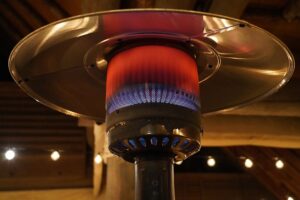Fire Safety Tips For Patio Heaters
 As the winter season approaches, patio heaters are coming out in full force. Whether you want to host a brunch or just enjoy some quality time outside, you need some heating element to keep you snug and cozy. In recent times, patio heaters have also been elevated as decorative features in homes. Whatever you’re using the patio heater for, you should exercise carefulness as they can pose a risk of fire if not used with caution.
As the winter season approaches, patio heaters are coming out in full force. Whether you want to host a brunch or just enjoy some quality time outside, you need some heating element to keep you snug and cozy. In recent times, patio heaters have also been elevated as decorative features in homes. Whatever you’re using the patio heater for, you should exercise carefulness as they can pose a risk of fire if not used with caution.
Here are 7 important fire safety tips for patio heaters that every homeowner should keep in mind when they plan to install and use this heating element in their home.
1. Ensure a Safe Distance
The location of the patio heater is very important. You need to give your patio heater or any other heating element enough space, ensuring a safe distance from the house door, the walls, the ceiling, and any furniture lying on the patio. Close proximity to any flammable material may incur the risk of fire, especially in case there is wind.
As a general rule, you should keep a 3 feet space on all sides of the patio heater unless recommended otherwise by the manufacturer. To do this, you might need to rearrange some things in your outdoor space, but it’s vital that you take this into consideration to avoid a fire.
2. Place the Heater on a Flat Surface
Outdoor spaces are not always flat, and you may find bumps and uneven surfaces on the ground. If you place a patio heater on an uneven surface, it may tip over and incur the serious risk of a fire or cause severe burns too.
Instead, you should make sure that you place the patio heater on a flat surface, where there are low to no chances of it getting knocked and rolling over. To ensure an even platform, you might need to level the ground.
3. Don’t Leave the Patio Heater Unattended
A crucial mistake that people make is leaving the patio heater unattended. You should refrain from doing so, especially if you have pets and kids in the vicinity. You should always switch off the heater or any other heating element when you leave or go indoors.
Patio heaters are placed outdoors, so they have a higher risk of causing a fire as they are exposed to all external elements and weather conditions. If the wind is particularly strong, the flames could blow out of the frame and cause a fire in your absence.
4. Keep a Fire Extinguisher Nearby
No matter how careful you are, a heating element always poses the risk of a fire. This is why it is important that you keep a fire extinguisher near the heating source, especially a patio heater that is meant to be outside. A fire extinguisher will help save you from the extent of fire damage.
However, you need to make sure that the fire extinguisher you buy is the right class for the heater that you use. For example, you would need Class B for gas heaters and Class C for electric heaters.
5. Review and Follow the Manufacturer’s Instructions
Every patio heater is unique. This is why it is important that you should diligently review and follow the instructions that the manufacturer has advised when you set up, use and clean the patio heater. It is important that you don’t use any methods that deviate from the maker’s guidelines.
We stress on this because some manufacturers require you to turn off a patio heater in a specific way. Not following the guidelines may cause a leak that may incur the risk of fire.
6. Always Check for Gas Leaks
When you are using a gas patio heater, it is vital that you should check for leaks and any other malfunction. Gas leaks are extremely risky, as they may cause suffocation or a fire. Before you set the heater up, you should conduct a thorough inspection to ensure there are no gas leaks.
If you spot any malfunction, do not use the heater until the problem has been fixed completely. If the heater is in use and you smell gas, immediately turn off the heater and call a professional to tend to this issue before continuing use.
7. Cover Heater When Not in Use
Another important fire safety tip is that you should always cover your patio heater up and store it properly when it is not in use, like during the summer months. If you fail to do this, the heater will likely get clogged with dust and debris that might then act as fuel to fire and may also fall prey to rust.
Moreover, when you unpack your heater, make sure you properly clean it so that there is no residue that may ignite a fire.
Fire Damage Mitigation
You should exercise caution to mitigate the chances of a fire. Unfortunately, accidents can still happen. If you want to reduce the chances of a fire in your home, you should get in touch with 911 Restoration of Fremont County. Our professionals are available 24/7/365 for any fire damage restoration needs you require.


